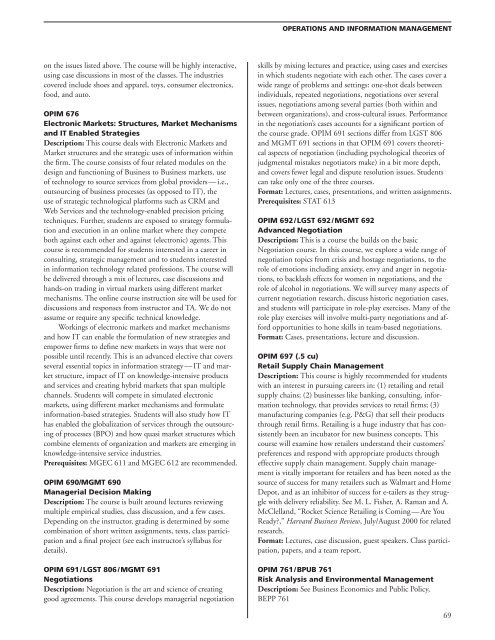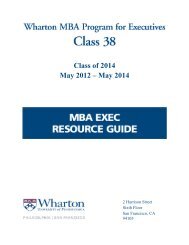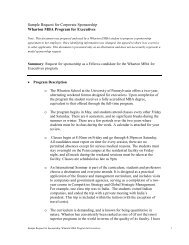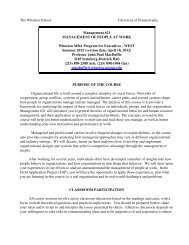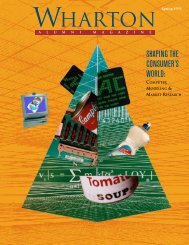Explore Options; Plan Your MBA Academic Program
Explore Options; Plan Your MBA Academic Program
Explore Options; Plan Your MBA Academic Program
You also want an ePaper? Increase the reach of your titles
YUMPU automatically turns print PDFs into web optimized ePapers that Google loves.
on the issues listed above. The course will be highly interactive,<br />
using case discussions in most of the classes. The industries<br />
covered include shoes and apparel, toys, consumer electronics,<br />
food, and auto.<br />
OPIM 676<br />
Electronic Markets: Structures, Market Mechanisms<br />
and IT Enabled Strategies<br />
Description: This course deals with Electronic Markets and<br />
Market structures and the strategic uses of information within<br />
the firm. The course consists of four related modules on the<br />
design and functioning of Business to Business markets, use<br />
of technology to source services from global providers — i.e.,<br />
outsourcing of business processes (as opposed to IT), the<br />
use of strategic technological platforms such as CRM and<br />
Web Services and the technology-enabled precision pricing<br />
techniques. Further, students are exposed to strategy formulation<br />
and execution in an online market where they compete<br />
both against each other and against (electronic) agents. This<br />
course is recommended for students interested in a career in<br />
consulting, strategic management and to students interested<br />
in information technology related professions. The course will<br />
be delivered through a mix of lectures, case discussions and<br />
hands-on trading in virtual markets using different market<br />
mechanisms. The online course instruction site will be used for<br />
discussions and responses from instructor and TA. We do not<br />
assume or require any specific technical knowledge.<br />
Workings of electronic markets and market mechanisms<br />
and how IT can enable the formulation of new strategies and<br />
empower firms to define new markets in ways that were not<br />
possible until recently. This is an advanced elective that covers<br />
several essential topics in information strategy — IT and market<br />
structure, impact of IT on knowledge-intensive products<br />
and services and creating hybrid markets that span multiple<br />
channels. Students will compete in simulated electronic<br />
markets, using different market mechanisms and formulate<br />
information-based strategies. Students will also study how IT<br />
has enabled the globalization of services through the outsourcing<br />
of processes (BPO) and how quasi market structures which<br />
combine elements of organization and markets are emerging in<br />
knowledge-intensive service industries.<br />
Prerequisites: MGEC 611 and MGEC 612 are recommended.<br />
OPIM 690/MGMT 690<br />
Managerial Decision Making<br />
Description: The course is built around lectures reviewing<br />
multiple empirical studies, class discussion, and a few cases.<br />
Depending on the instructor, grading is determined by some<br />
combination of short written assignments, tests, class participation<br />
and a final project (see each instructor’s syllabus for<br />
details).<br />
OPIM 691 / LGST 806 / MGMT 691<br />
Negotiations<br />
Description: Negotiation is the art and science of creating<br />
good agreements. This course develops managerial negotiation<br />
OPERATIONS AND INFORMATION MANAGEMENT<br />
skills by mixing lectures and practice, using cases and exercises<br />
in which students negotiate with each other. The cases cover a<br />
wide range of problems and settings: one-shot deals between<br />
individuals, repeated negotiations, negotiations over several<br />
issues, negotiations among several parties (both within and<br />
between organizations), and cross-cultural issues. Performance<br />
in the negotiation’s cases accounts for a significant portion of<br />
the course grade. OPIM 691 sections differ from LGST 806<br />
and MGMT 691 sections in that OPIM 691 covers theoretical<br />
aspects of negotiation (including psychological theories of<br />
judgmental mistakes negotiators make) in a bit more depth,<br />
and covers fewer legal and dispute resolution issues. Students<br />
can take only one of the three courses.<br />
Format: Lectures, cases, presentations, and written assignments.<br />
Prerequisites: STAT 613<br />
OPIM 692 / LGST 692 / MGMT 692<br />
Advanced Negotiation<br />
Description: This is a course the builds on the basic<br />
Negotiation course. In this course, we explore a wide range of<br />
negotiation topics from crisis and hostage negotiations, to the<br />
role of emotions including anxiety, envy and anger in negotiations,<br />
to backlash effects for women in negotiations, and the<br />
role of alcohol in negotiations. We will survey many aspects of<br />
current negotiation research, discuss historic negotiation cases,<br />
and students will participate in role-play exercises. Many of the<br />
role play exercises will involve multi-party negotiations and afford<br />
opportunities to hone skills in team-based negotiations.<br />
Format: Cases, presentations, lecture and discussion.<br />
OPIM 697 (.5 cu)<br />
Retail Supply Chain Management<br />
Description: This course is highly recommended for students<br />
with an interest in pursuing careers in: (1) retailing and retail<br />
supply chains; (2) businesses like banking, consulting, information<br />
technology, that provides services to retail firms; (3)<br />
manufacturing companies (e.g. P&G) that sell their products<br />
through retail firms. Retailing is a huge industry that has consistently<br />
been an incubator for new business concepts. This<br />
course will examine how retailers understand their customers’<br />
preferences and respond with appropriate products through<br />
effective supply chain management. Supply chain management<br />
is vitally important for retailers and has been noted as the<br />
source of success for many retailers such as Walmart and Home<br />
Depot, and as an inhibitor of success for e-tailers as they struggle<br />
with delivery reliability. See M. L. Fisher, A. Raman and A.<br />
McClelland, “Rocket Science Retailing is Coming — Are You<br />
Ready?,” Harvard Business Review, July/August 2000 for related<br />
research.<br />
Format: Lectures, case discussion, guest speakers. Class participation,<br />
papers, and a team report.<br />
OPIM 761 / BPUB 761<br />
Risk Analysis and Environmental Management<br />
Description: See Business Economics and Public Policy,<br />
BEPP 761<br />
69


